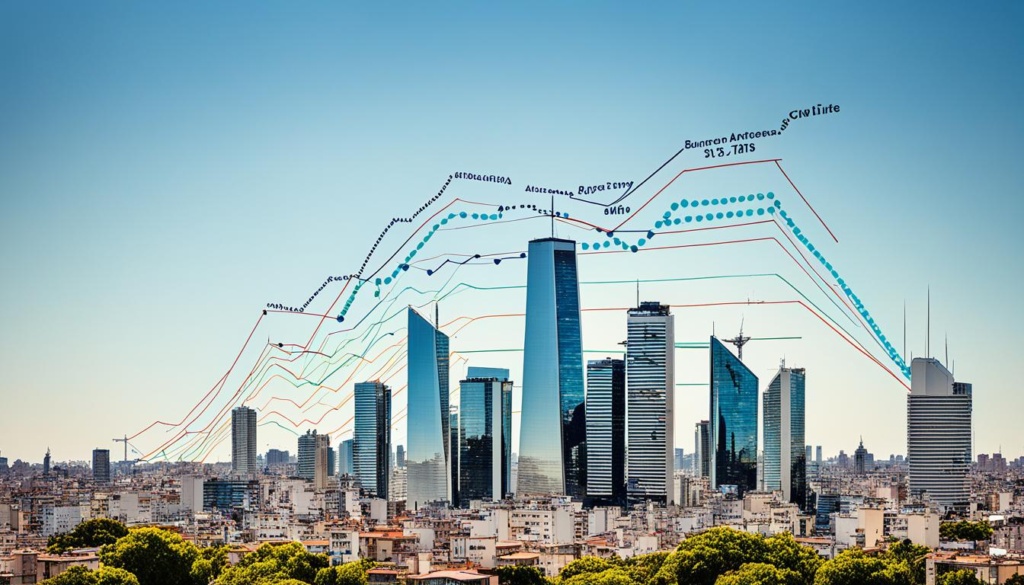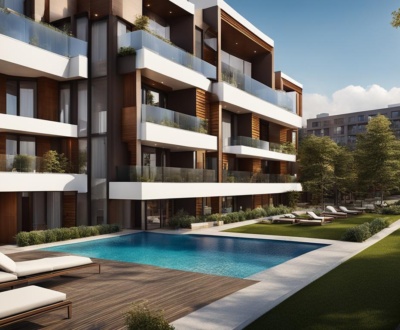Welcome to our latest update on the property market in Argentina! In this article, we will provide you with valuable information on the latest trends, investment opportunities, and market analysis in the Argentine real estate sector.
As we step into the year 2024, the real estate landscape in Argentina continues to evolve, presenting both challenges and opportunities for investors, homeowners, and industry stakeholders. Argentina’s economy and stability have historically been characterized by cycles of boom and bust, which have had a significant impact on its real estate market.
The housing market has been subject to these fluctuations, with affordability being a consistent issue. Government policies have played a crucial role in shaping the housing market, and the Argentine government has implemented initiatives to address the housing crisis and stimulate the market. However, regulatory changes and economic policies have sometimes created uncertainty.
Foreign investors view Argentina as a safe haven for real estate investment, but there are risks related to economic volatility and currency devaluation. It’s essential for investors to seek local legal advice to navigate the complexities of the market.
Stay tuned for our upcoming sections where we will delve deeper into the economic factors, housing prices, and investment considerations in Argentina’s real estate market. We will provide you with a comprehensive overview and forecast, ensuring you have the information you need to make informed decisions.
Keep up to date with the latest Argentina Real Estate News and market insights to stay ahead of the game!
The Economy and Real Estate in Argentina
The real estate market in Argentina is closely intertwined with the volatility and fluctuations of the country’s economy. Argentina has experienced cycles of boom and bust, which have left a significant impact on the real estate sector. The fluctuations in the economy, high inflation rates, and political instability have influenced property prices and the overall real estate market in Argentina.
One of the key challenges in the housing market is affordability, primarily driven by high inflation. The constant increase in prices makes it difficult for potential homeowners to gain access to affordable housing, perpetuating the housing crisis in the country. The rental market has also experienced shifts in demand due to economic conditions, affecting rental prices and vacancy rates.
To stimulate the housing market, the Argentinian government has implemented various policies, including tax incentives and subsidized mortgage programs. However, the effectiveness of these policies has been limited due to broader economic challenges facing the country.
Recent regulatory changes have also impacted the real estate market. Stricter mortgage lending regulations have been introduced to mitigate risks associated with lending practices, while measures to combat money laundering in real estate transactions aim to improve transparency within the market. These changes in regulations and economic policies have created uncertainty for both buyers and sellers.
Despite the challenges, Argentina remains an attractive destination for real estate investment, particularly for foreign investors. The country offers investment opportunities in both residential and commercial properties. However, it is important for investors to be aware of the economic instability and currency devaluation risks that may impact their investments. Seeking local legal advice is crucial to navigate the complex market dynamics and ensure compliance with regulations.
In summary, the real estate market in Argentina is influenced by economic fluctuations and government policies. Affordability, regulatory changes, and the country’s economic instability are key factors that shape the industry. Nonetheless, Argentina’s real estate market continues to attract foreign investors, offering potential investment opportunities despite the challenges.
Outlook and Forecast for Argentina’s Real Estate Market
Economic Stability and Regional Growth
The outlook for Argentina’s real estate market is influenced by various factors, including economic stability, government policies, and regional growth prospects. Despite historical cycles of inflation and economic instability, there is cautious optimism for the future.
Regional growth is expected to continue in urban centers such as Buenos Aires, Cordoba, and Rosario, which have traditionally experienced rapid economic and industrial activities driving the real estate market. However, emerging trends in suburban and rural areas, propelled by remote work opportunities, may divert some attention from traditional urban centers.
The larger market size of Argentina compared to its neighboring countries offers significant growth opportunities. The country’s economic forecast can be more volatile, but it provides an attractive investment landscape.
Housing affordability is expected to be a priority for government policies in 2024. The government may focus on implementing measures to improve accessibility to housing, regulate foreign investment, and address taxation related to real estate transactions.
Risks and Improvements
While there are promising improvements in the country, it is important to consider the risks involved in the Argentina real estate market. Economic instability, currency devaluation, and political uncertainty are factors that could impact demand and property values.
| Risks to consider in Argentina real estate market | Improvements in the country |
|---|---|
| Economic instability | Increased foreign investment |
| Currency devaluation | Stable or improving global economy |
| Political uncertainty | Successful government policies for economic stabilization |
Investors must carefully assess these risks and evaluate the market conditions before making property investments in Argentina. Seeking local legal advice is crucial to navigate the complexities of the market and ensure compliance with regulations.
Overall, the outlook for Argentina’s real estate market presents opportunities for growth, influenced by economic factors, government policies, and regional trends. However, it is important to consider risks and make informed investment decisions to succeed in this dynamic market.
Housing Prices in Argentina’s Real Estate Market
The trend in housing prices in Argentina’s real estate market is closely tied to the country’s economic context. While the market has shown resilience in the face of economic difficulties, it has not been immune to the challenges posed by inflation, currency devaluation, and other factors.
During times of economic crisis, real estate prices often initially remain stable, thanks in part to pricing being in U.S. dollars. However, prolonged economic difficulties, such as high inflation and decreased purchasing power, eventually result in a slowdown in the market and adjustments in property values.
When comparing current housing prices to those from a decade ago, it’s important to consider inflation and currency fluctuations. Adjusting for these factors, it becomes evident that real property values may not have significantly increased and, in some cases, may have even decreased.
Currently, the real estate market in Argentina exhibits a mixed pattern in terms of housing prices. Some areas experience price growth, while others maintain stable prices or even witness declining prices. The regional economic activities, infrastructure developments, and overall demand are key factors influencing these trends.
Cities like Buenos Aires and popular tourist destinations often see higher growth in real estate prices, driven by both local and international demand. On the other hand, rural areas generally have lower property values, unless they are situated near tourist attractions or offer desirable lifestyle properties.
Considering these price dynamics is crucial when assessing the Argentina real estate market and making informed investment decisions.
Regional Economic Activities and Housing Prices
The housing prices in Argentina are heavily influenced by regional economic activities. Certain regions, especially urban centers and tourist destinations, experience stronger demand and higher real estate prices compared to rural areas.
“Argentina’s real estate market is a tale of two cities, with Buenos Aires and other major urban centers seeing rising property prices, while rural areas struggle to keep up.”
| Region | Economic Activities | Housing Price Trend |
|---|---|---|
| Buenos Aires | Financial services, commerce, tourism | Rising prices |
| Patagonia | Tourism, agricultural activities | Stable prices |
| Northern provinces | Agriculture, mining | Declining prices |
A closer look at the regional dynamics reveals that cities like Buenos Aires, with their vibrant economic activities and strong tourism industry, drive real estate prices upwards. On the other hand, regions that heavily rely on agriculture or mining may experience declining prices due to a variety of economic factors.
By understanding the relationship between regional economic activities and housing prices, investors can make more informed decisions and identify areas with potential for growth or stability.

A striking image showcasing the dynamics of housing prices in Argentina’s real estate market.
Overview of the Argentine Real Estate Market
The Argentine real estate market has undergone significant transformations in recent years, fueled by economic stability, urban development, and foreign investments. Major cities like Buenos Aires, Cordoba, and Rosario have witnessed rapid growth, attracting both residential and commercial property developments.
Foreign investments have played a crucial role in expanding the market, with legislative reforms and attractive investment opportunities driving market expansion. The demand for housing has been a major market driver, fueled by urbanization trends and population influx into metropolitan areas.
Commercial property developments, particularly in central business districts, have experienced robust growth, reflecting the country’s economic progress. The market has also witnessed technological integration, with smart home systems and sustainable architecture reshaping the industry.
Challenges and Opportunities
Despite the positive growth trajectory, the Argentine real estate market faces challenges related to regulatory framework stability, sustainability initiatives, and infrastructure improvements. Ensuring a stable regulatory environment and promoting sustainability practices are crucial for long-term market growth.
However, the government’s initiatives and policies, along with the impact of the tourism sector, continue to stimulate market expansion. The emergence of co-living spaces, co-working environments, and PropTech solutions are shaping the future of the Argentine real estate market, offering new investment opportunities and catering to changing lifestyle preferences.
Regulatory Framework and Sustainability
The regulatory framework plays a key role in providing stability and attracting investments to the real estate market. Legislative reforms aimed at creating an attractive investment environment have paved the way for both domestic and foreign investors.
Sustainability has become a significant focus, with innovative approaches and sustainable practices shaping the industry. From energy-efficient buildings to green spaces and eco-friendly design, the market is embracing sustainability as a core value.
Infrastructure Development and Governmental Initiatives
Infrastructure development is essential for enhancing property values and attracting investments. The government has been implementing various initiatives aimed at improving infrastructure, including transportation networks and urban amenities.
Governmental initiatives also play a crucial role in providing economic stability and promoting investment opportunities. Policy decisions related to foreign investment regulations, taxation, and economic reforms influence the market’s growth trajectory and overall attractiveness to investors.
Tourism Sector Impact and Emerging Trends
The tourism sector has a significant impact on the Argentine real estate market, particularly in the hospitality and leisure property segments. The country’s rich cultural heritage and diverse landscapes attract both local and international tourists, driving demand for vacation properties and short-term rentals.
Emerging trends in the market include the integration of technology, such as smart home systems and virtual reality tours, providing innovative solutions for buyers and investors. Additionally, the market is witnessing a shift towards sustainable and eco-friendly properties, aligning with global environmental goals.
Amidst challenges and opportunities, the Argentine real estate market offers a promising outlook for investors and stakeholders. With its growth prospects, economic stability, and urban development, the market presents attractive investment opportunities in both residential and commercial sectors.
Economic Factors and Real Estate Growth in Argentina
Economic factors play a crucial role in driving real estate growth in Argentina. A stable regulatory environment is essential for market stability and investor confidence. Economic reforms, regulatory measures, and transparency promote the sector’s growth, while sustainability practices and technological advancements contribute to environmental goals. Infrastructure development and accessibility, including transportation networks, enhance property values and attract investments.
Government initiatives, tax reforms, and legislative measures aimed at encouraging investments create a favorable market environment. The thriving tourism industry in Argentina contributes significantly to market expansion, particularly in the hospitality and leisure property segments. Stability in the property market is also influenced by factors such as property market stability and investor confidence.
Overall, economic factors and government initiatives are important drivers of real estate growth in Argentina.

Investor Confidence and Market Stability
Investor confidence plays a vital role in the growth and stability of the real estate market in Argentina. A stable regulatory environment provides assurance to investors and encourages long-term investment. When the regulatory framework is transparent and consistent, it fosters trust and attracts both local and foreign investors.
“A stable regulatory environment ensures transparency and attracts both local and foreign investors, leading to market stability and growth.” – Real Estate Expert
Government Initiatives and Economic Reforms
The Argentine government has implemented various initiatives and economic reforms to stimulate real estate growth. These initiatives include tax reforms, legislative measures, and incentives to encourage investments. By creating a favorable tax environment and reducing bureaucratic processes, the government aims to attract more investors and drive the real estate sector forward.
Sustainability and Technological Advancements
Sustainability practices and technological advancements are key factors contributing to the growth of the real estate market in Argentina. With an increasing focus on environmental goals, developers are incorporating sustainable features into their projects. Additionally, technological advancements such as smart home systems and PropTech solutions are revolutionizing the industry, making properties more attractive to buyers and investors.
Infrastructure Development and Accessibility
Infrastructure development plays a significant role in the growth of the real estate market. Improved transportation networks and accessibility to amenities, such as schools, hospitals, and commercial centers, enhance property values and attract investors. Infrastructure projects, including road networks, public transportation, and urban development, contribute to the overall growth and desirability of certain areas within the country.
The Tourism Industry and Market Expansion
The thriving tourism industry in Argentina has a significant impact on the real estate market. The demand for hospitality and leisure properties has increased due to the influx of tourists. This has led to market expansion and opportunities for investors in these segments. Popular tourist destinations and cities experience higher growth in real estate prices, making them attractive investment options for both local and foreign investors.
Forecast and Opportunities for Argentina’s Real Estate Market
The real estate market in Argentina holds a promising outlook with significant growth potential and sustained expansion. Projections indicate a compound annual growth rate (CAGR) of 3.8% from 2023 to 2028, reflecting a positive trajectory for the market.
Economic stability plays a crucial role in driving this growth, providing a favorable environment for both local and foreign investors. Technological advancements and sustainable practices are transforming the market, introducing innovative solutions and boosting efficiency.
Regulatory reforms are shaping the future of the market by fostering transparency, improving investor confidence, and facilitating seamless real estate transactions. These reforms contribute to the market’s resilience and its ability to withstand economic fluctuations and external challenges.
The Argentina real estate market offers diverse investment opportunities across various segments. From residential properties in urban centers to commercial developments in thriving business districts, investors have the chance to tap into a range of lucrative sectors.
The market’s future prospects are intrinsically linked to emerging trends and changing lifestyle preferences. As technological integration and digitalization become more prominent, the demand for smart homes and sustainable living spaces is on the rise.
Embracing innovation, sustainability, and regulatory reforms will shape the future prospects of the Argentina real estate market.
Overall, the forecast for Argentina’s real estate market points to a positive trajectory and ample opportunities for investors. By staying attuned to emerging trends, understanding the changing preferences of buyers and tenants, and leveraging technological advancements, investors can position themselves for success in this growing market.
Key Opportunities in Argentina’s Real Estate Market
- Diversification: Opportunities abound across residential, commercial, and hospitality segments.
- Urbanization: Demand for properties in urban centers is on the rise due to population influx and changing lifestyle preferences.
- Technological Integration: Embracing smart home systems and innovative technologies can enhance property value and attract tech-savvy buyers.
- Sustainability Practices: Building sustainable and energy-efficient properties aligns with global environmental goals and attracts environmentally conscious buyers.
- Regulatory Reforms: Take advantage of legislative changes that foster transparency and streamline property transactions.
| Market Resilience Factor | Opportunities |
|---|---|
| Economic Stability | Potential for sustained expansion and growth |
| Technological Advancements | Integration of smart home systems, virtual tours, and digitized property management |
| Sustainability | Increasing demand for eco-friendly and energy-efficient properties |
| Regulatory Reforms | Improved transparency, efficiency, and investor confidence |
| Changing Lifestyle Preferences | Rising demand for urban living, smart homes, and sustainable housing options |
Seizing opportunities in Argentina’s real estate market requires a proactive approach, meticulous market research, and a deep understanding of the changing dynamics within the industry. By staying informed and capitalizing on the forecasted growth, investors can navigate this evolving market and achieve favorable returns.
Challenges in Argentina’s Real Estate Market
Argentina’s real estate market is not without its challenges. The regulatory environment, economic uncertainties, currency devaluation, and political instability pose risks and uncertainties for buyers and sellers. These challenges can affect property transactions and result in economic fluctuations, reduced demand, and falling property values.
The regulatory environment is an important consideration for anyone looking to buy or sell real estate in Argentina. The legal framework and regulations surrounding property transactions can create uncertainties and complexities. It is essential to navigate these regulatory challenges with the help of legal professionals who have expertise in the Argentine real estate market.
Economic uncertainties, including currency devaluation, can significantly impact the real estate market. Fluctuating exchange rates and economic instability can affect property values and investor confidence. Moreover, political instability adds another layer of uncertainty, influencing market dynamics and potentially deterring foreign investors.
Property transactions are also subject to economic fluctuations. Changes in the economy can result in reduced demand for real estate, affecting both residential and commercial properties. Economic downturns can lead to falling property values, requiring careful market assessment before making investment decisions.
To illustrate these challenges, let’s take a look at the table below:
| Challenges | Impact |
|---|---|
| Regulatory environment | Creates uncertainties for buyers and sellers. |
| Economic uncertainties | Affects property transactions and can result in reduced demand and falling property values. |
| Currency devaluation | Influences property values and can pose risks for foreign investors. |
| Political instability | Creates uncertainties in the market and impacts investor confidence. |
As with any investment, navigating these challenges requires careful consideration and market research. It is important to stay informed about the regulatory environment, economic conditions, and political climate. Seeking expert advice and conducting thorough due diligence will help mitigate risks and make informed investment decisions.
Next, let’s explore the impact of foreign investment in Argentina’s real estate market.
Foreign Investment in Argentina’s Real Estate Market
Foreign investment in Argentina’s real estate market presents lucrative opportunities for investors. The country allows non-residents to own property without any restrictions, making it an attractive destination for international buyers. Major cities like Buenos Aires, Córdoba, and Mendoza are particularly sought after by foreign investors, with a focus on residential properties in urban and suburban areas.
The real estate market in Argentina also offers high rental yields, making it an appealing option for those looking to generate regular income from their investments. However, it’s important for foreign investors to be aware of certain factors that can impact their investments.
Economic volatility and fluctuating exchange rates are common challenges in Argentina. The country has experienced periods of economic instability, which can affect property values and rental returns. Additionally, bureaucratic processes for property transactions can be complex and time-consuming.
Despite these challenges, the legal framework surrounding real estate investment in Argentina provides stability. However, it’s crucial to stay informed about any changes or updates in the regulations that may affect foreign investors.
To navigate the complexities of the market and ensure compliance with local regulations, foreign investors should seek local legal advice. Professionals with expertise in the Argentine real estate market can provide valuable guidance and help streamline the investment process.
Overall, foreign investment in Argentina’s real estate market can be a rewarding venture, offering attractive opportunities for property ownership and rental income. However, it’s essential for investors to carefully evaluate the economic landscape, understand the bureaucratic processes involved, and seek professional advice to ensure capital safety and maximize their investment potential.
| Factors Considered | Opportunity Level |
|---|---|
| Property Ownership | High |
| Rental Yields | High |
| Economic Volatility | Medium |
| Exchange Rates | Medium |
| Bureaucratic Processes | Medium |
| Legal Framework | High |
| Capital Safety | Medium |
Investment Considerations for Argentina’s Real Estate Market
Before making a real estate investment in Argentina, it is important to consider several factors that can impact your decision. Conducting thorough market research will provide valuable insights into local market conditions, economic trends, and property valuations.
Seeking local legal advice is crucial to navigate the complex legal framework and ensure compliance with regulations. An experienced attorney can provide guidance on property ownership, transaction processes, and any legal implications related to your investment.
Evaluating the rental market and analyzing potential returns on investment will help you assess the profitability of the property. Understanding rental demand, vacancy rates, and rental yields in the specific location will inform your decision-making process.
Investing in real estate carries both risks and rewards. It is vital to carefully balance these factors and consider the potential risks associated with economic fluctuations, currency devaluation, and political instability. Additionally, understanding the rewards of real estate investment, such as long-term appreciation and rental income, will help you make an informed decision.
“Successful real estate investment requires careful consideration of market conditions and thorough research. By understanding the local market, seeking legal advice, evaluating rental potential, and assessing risks and rewards, you can make confident investment decisions in Argentina’s real estate market.”
Considering these key investment considerations will empower you to navigate the intricacies of Argentina’s real estate market and make informed decisions that align with your financial goals and risk appetite.
Property Pack and Market Insights for Argentina Real Estate
To stay informed and make well-informed investment decisions in Argentina’s real estate market, accessing comprehensive market insights is crucial. A property pack specifically tailored to the Argentine market provides valuable information on property trends, market analysis, and investment guidance. The property pack includes data-driven advice and access to expert consultation, allowing investors to stay updated on market conditions and make informed decisions. Investing in a property pack can provide a comprehensive understanding of the Argentine real estate market.
Investors who want a deeper understanding of the Argentina real estate market can benefit from the exclusive Property Pack offered by our expert consultants. This comprehensive pack covers market insights, analysis, and trends that can guide your investment decisions. With a focus on data-driven advice and expert consultation, the Property Pack provides invaluable information on property market trends, investment strategies, and the latest regulatory updates.
Market Analysis and Trends
The Property Pack includes an in-depth analysis of the Argentine real estate market, including detailed insights into property trends, regional variations, and market forecasts. Our experts delve into the factors influencing property prices, rental yields, and investment opportunities. You’ll gain valuable insights into market dynamics, including emerging trends, changing preferences, and market drivers shaping the real estate landscape in Argentina.
Expert Consultation and Investment Guidance
With the Property Pack, you’ll have access to expert consultation with our seasoned real estate professionals. They will provide personalized investment guidance tailored to your specific goals and risk appetite. Whether you’re looking to invest in residential properties, commercial spaces, or agricultural land, our experts will offer valuable advice to maximize your returns and minimize risks.
Data-Driven Advice and Market Reports
Our Property Pack is backed by robust data analysis and comprehensive market reports. From property valuations to rental market trends, you’ll have access to the latest data and statistics that can help you make informed investment decisions. Stay updated on key market indicators, market sentiment, and regulatory changes that impact the real estate sector.
Property Pack Features
| Property Pack Features | Description |
|---|---|
| Market Analysis | Detailed insights into property trends, regional variations, and market forecasts in Argentina. |
| Investment Guidance | Personalized advice and guidance from our seasoned real estate professionals. |
| Data-Driven Reports | Comprehensive market reports with the latest data and statistics. |
| Expert Consultation | Access to one-on-one consultation with our real estate experts. |
Investing in the Property Pack offers a competitive edge in the Argentine real estate market. Stay ahead of the competition with up-to-date market insights, data-driven advice, and expert consultation. Don’t miss out on lucrative investment opportunities and make informed decisions with our Property Pack.
Conclusion
The real estate market in Argentina presents a unique landscape of challenges and opportunities for investors. Despite a history of economic fluctuations and political instability, the market has shown resilience and transformation. The key to navigating this dynamic market lies in understanding the factors that contribute to its growth potential.
Economic stability, government initiatives, and legislative reforms are crucial drivers of the Argentine real estate market. These factors create an environment that fosters investment opportunities and supports the growth of the property market. However, it is important to consider specific considerations such as housing affordability, foreign investment regulations, and fiscal policies when making investment decisions.
To make informed choices, investors are encouraged to access comprehensive market insights and stay updated on the latest real estate trends. These resources provide valuable information and analysis that can guide investment decisions in the Argentine market. Seeking local legal advice further ensures compliance with regulations and helps navigate the intricacies of the real estate landscape.
Argentina’s real estate market continues to captivate the attention of investors and industry stakeholders due to its unique factors and growth prospects. By staying informed with the latest Argentina Real Estate News and market insights, investors can seize the opportunities presented by this dynamic market and navigate it successfully.
More from our blog
See all postsRecent Posts
- Argentina Property Management: Expert Care & Services February 2, 2024
- Understanding Argentina Real Estate Law Essentials February 2, 2024
- Argentina Luxury Apartments: Upscale Living February 1, 2024










